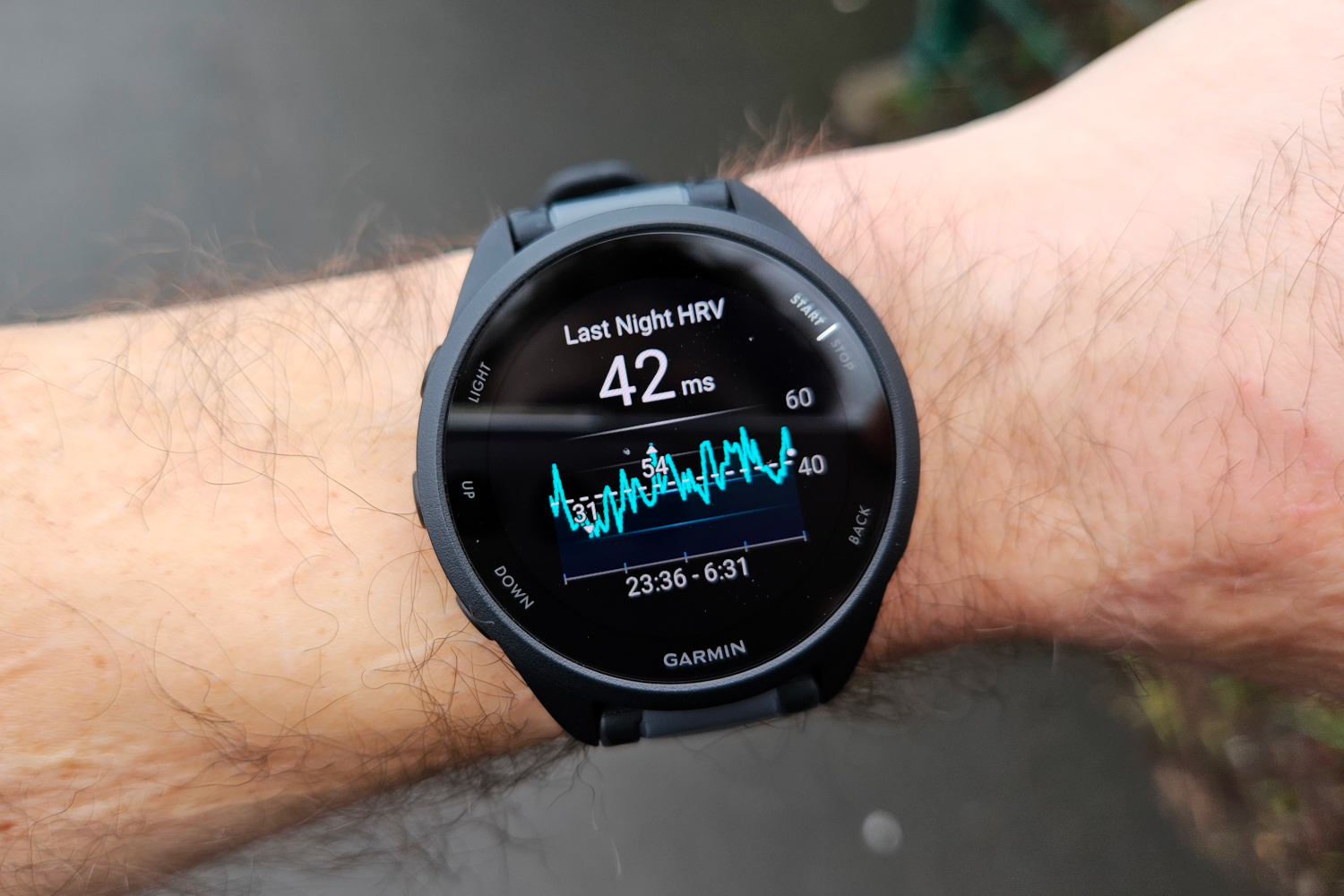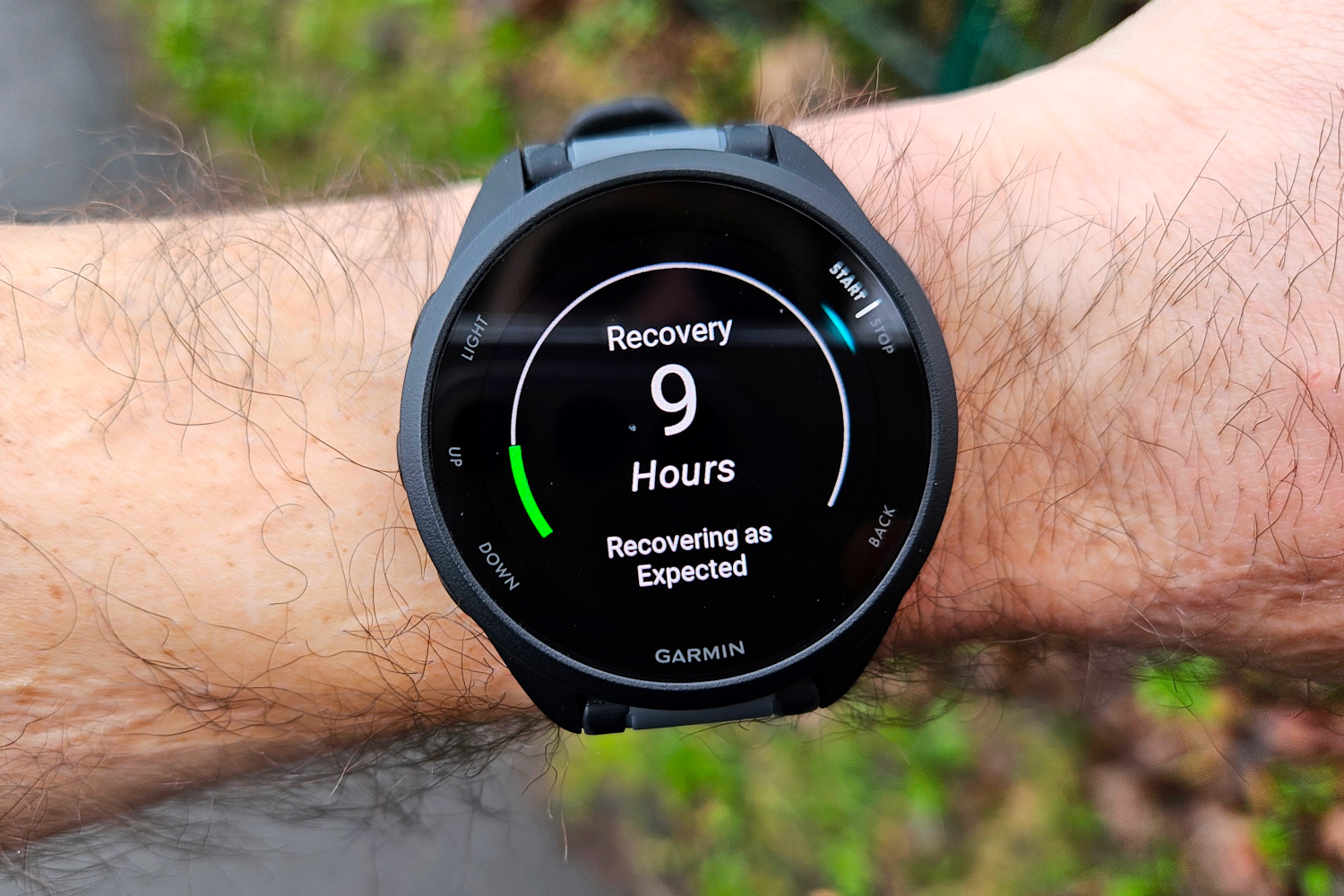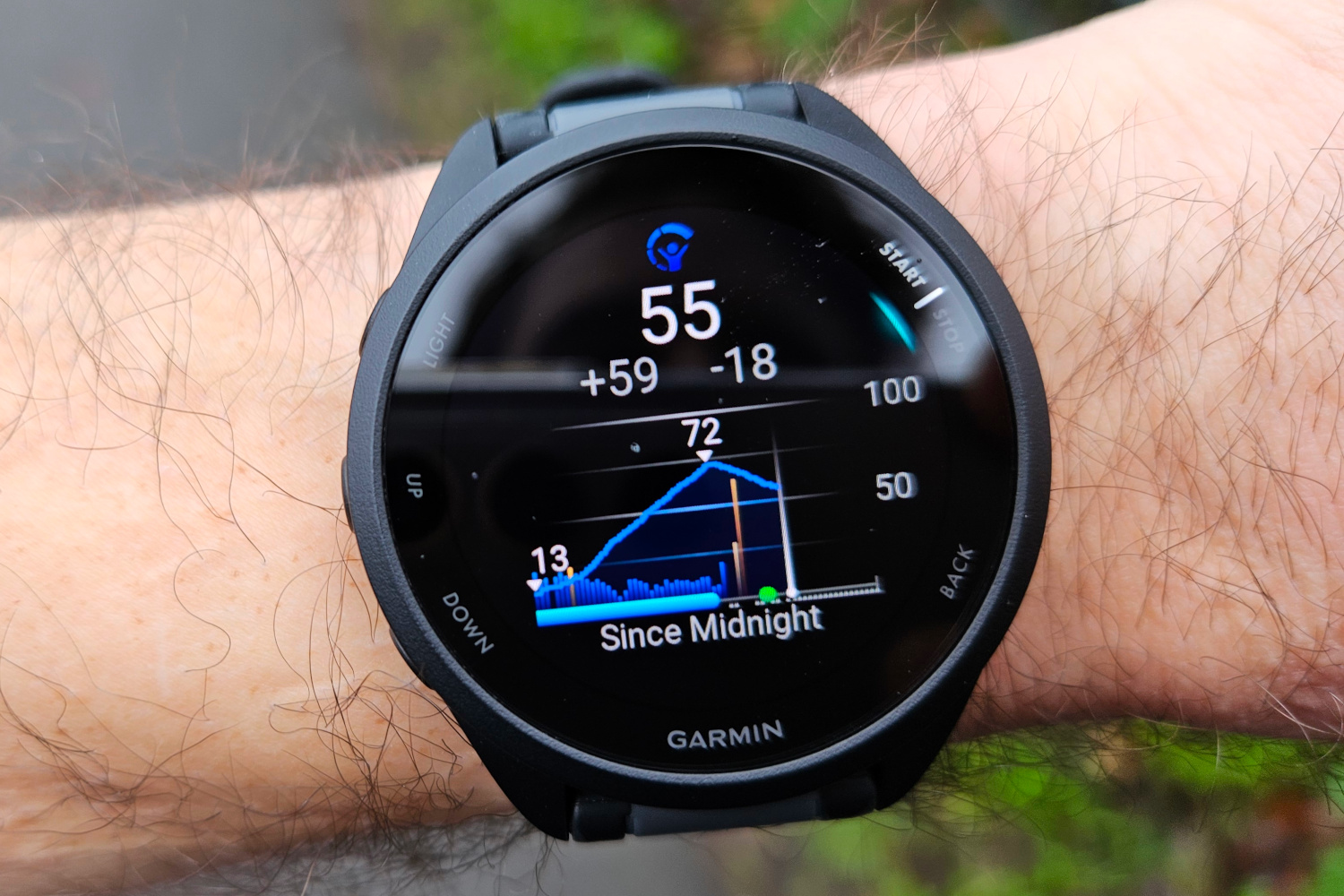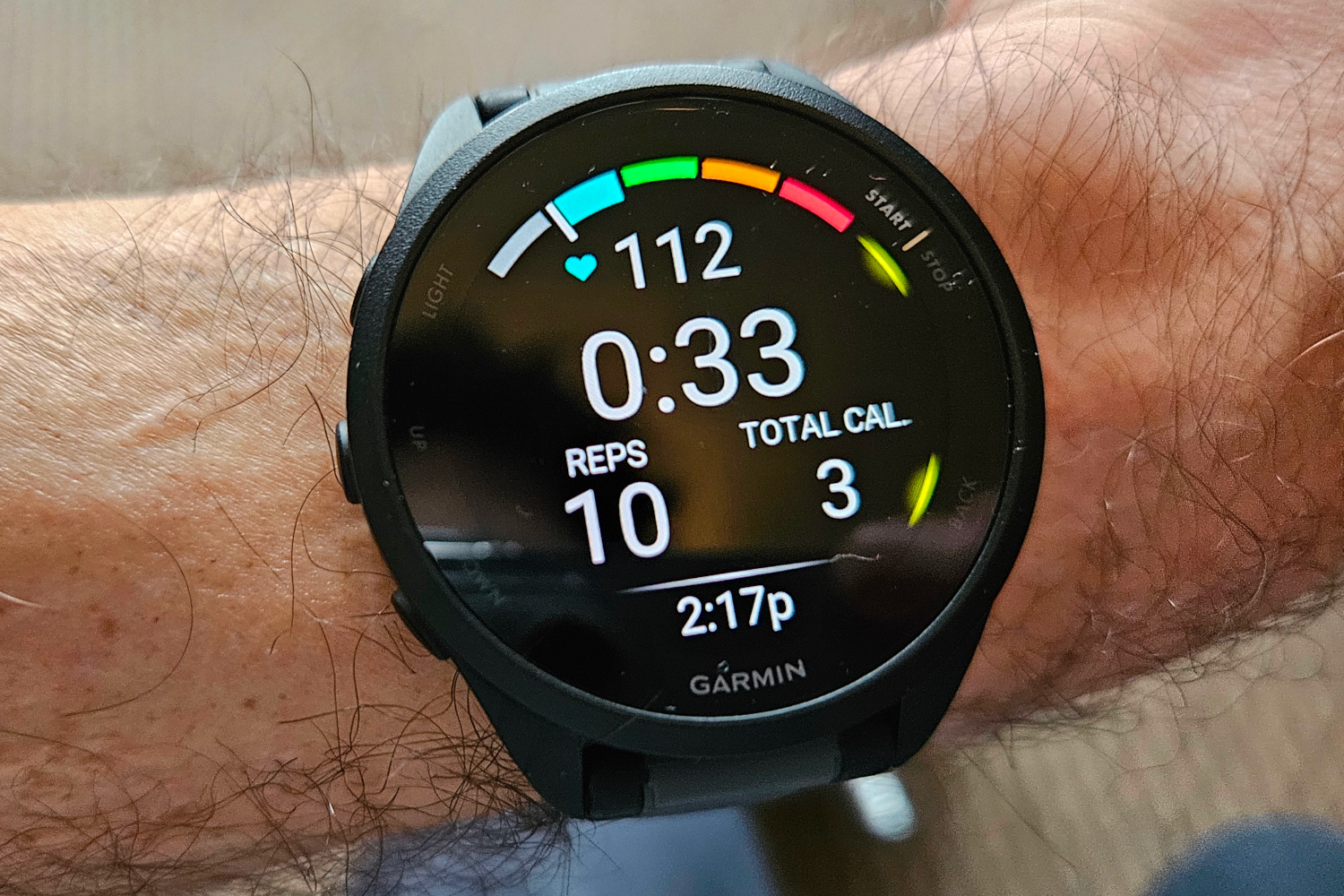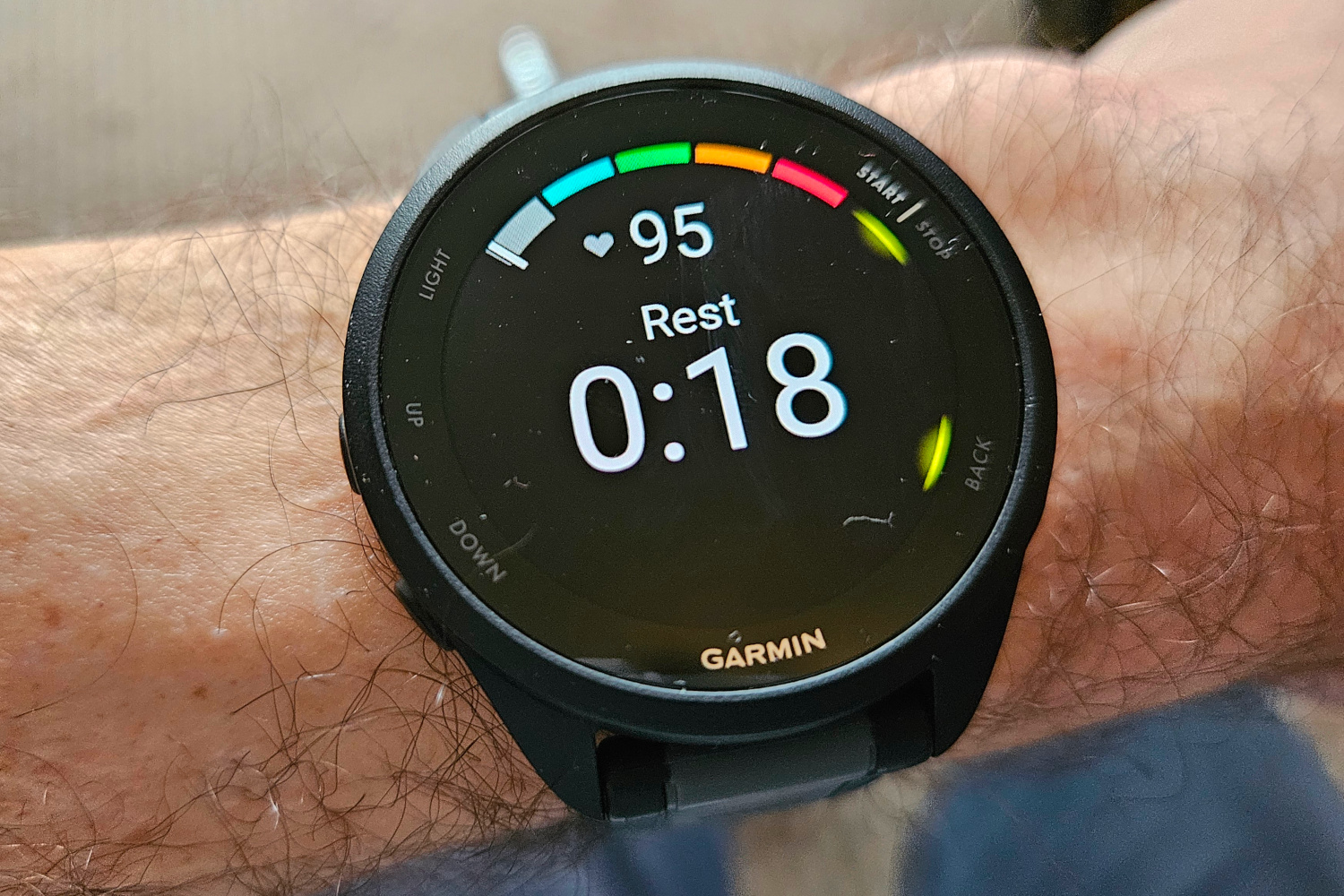Garmin Forerunner 165 review: a must-buy fitness watch
Garmin Forerunner 165
MSRP $250.00
“The Garmin Forerunner 165 is a great little fitness watch, delivering excellent running features (and more) at a fantastic price.”
Pros
- Excellent running mode
- Good tracking for other workouts
- Attractive design
- Weeklong battery life
- Improved Garmin Connect app
- Great price
Cons
- Fitness tracking outside of running is a little limited
- No map support
Adding a new model to an existing range can be tricky, but that’s just what Garmin is trying to do with the Forerunner 165. Placed between the budget Forerunner 65 and midrange Forerunner 265, the Forerunner 165 is a reasonably priced smartwatch that focuses on providing everything a runner needs to keep moving.
There were many ways Garmin could have slipped up here — for example, by failing to add enough to differentiate the 165 from its immediate siblings above and below it in price. Thankfully, that’s not the case. I took the Garmin Forerunner 165 for a spin for a few weeks, and I’m pleased to report that Garmin’s latest running watch is an excellent addition to its roster — and a must-buy if you want a fitness watch at a more reasonable price.
Comfortable design, complex controls

There’s no hiding that this is a sporty smartwatch, but that’s not a bad thing. I’d previously been using the Garmin Vivoactive 5, a similarly priced smartwatch aimed at mental wellness and general health rather than fitness, and the differences between the two are striking.
Where the Vivoactive is sleek and smooth, the Forerunner is blocky and angular, made from a fiber-reinforced polymer (fancy plastic) with flat edges. How you feel about this design will change depending on your tastes, but it strongly reminded me of the Casio watches of old. There’s a relatively chunky bezel around the display, but that just gave Garmin room to add labels for the five (yes, five) buttons, which adds to the old-school style.

The strap is made from silicone and has plenty of holes for a precise fit. I’ve worn a variety of fitness watches now, and I can happily say the in-box strap supplied with the Forerunner 165 is one of the most comfortable I’ve used. I’m several weeks in now, and there’s no sign of skin irritation from prolonged wear. It got a little itchy after one workout, but a quick wash of the watch and wrist fixed that. If you do want to swap the included strap out, it’s easy to do so, thanks to the industry-standard 20mm quick-release attachments.
The display is a 1.2-inch circular OLED panel, and it’s gorgeous. The colors are bright and vivid, and the blacks are dark. There’s an always-on display if you want it, but the lift-to-wake function has been reliable enough that I didn’t need it. As a result, I could avoid the hit on battery life.

The Garmin Forerunner 165 has a touchscreen, which works well and is responsive, but you can also choose to use the five buttons surrounding the screen. I’ll be honest; five buttons are too many, and I still find myself forgetting which button is which, even after several weeks. The labels help, but it’s far from perfect in this regard.
I also found the buttons a little too easy to push accidentally, so my watch often sat on a status screen I hadn’t consciously opened. Still, this is a relatively minor complaint, and I’m sure more time will mean I eventually get used to the large number of buttons on offer.
The Forerunner 165’s software and performance

The Forerunner 165 runs on Garmin’s proprietary operating system, and it’s much improved here. I wasn’t a huge fan of it in the Vivoactive 5, but I’ve found it much more palatable this time around. I much prefer the design offered on the Forerunner series, and this is paired with a much faster and snappier performance. Before this, I hadn’t realized how slow the Vivoactive 5 could be and how much it had soured me on Garmin’s software. This time around, I’m finding it much better to use, and the swift performance is a big part of that.
It’s not Wear OS, so you won’t find the wide range of supported apps you would on a Google Pixel Watch 2, but it’s not entirely lacking in this regard. Apps are downloaded through the Garmin Connect IQ app store on your connected smartphone or through the watch itself.
While there isn’t a ton to pick from, you can download music apps from Spotify, Deezer, and Amazon Music, weather apps like Accuweather, or map apps from Komoot. A map app is highly recommended if you’re planning on doing a lot of running routes, as there’s no built-in map support. However, this is very much a workaround, so if you’re planning on doing guided hikes or runs, consider buying a more expensive watch with this support, like a Garmin Fenix or Garmin Forerunner 965.
If you’re sporting the Music variant of the Forerunner 165, keep in mind that downloaded playlists can quickly take up most of the paltry 4GB of onboard storage, leaving little room for apps.
There are also some personal safety features here, including emergency assistance, automatic incident detection, and a real-time location-sharing tool (called LiveTrack). When triggered, all of these notify a number of selected contacts, giving you some peace of mind while out running at night or in secluded areas.
Smart features are also included, such as the ability to send replies to messages. You can only send preset messages, though, which is a downgrade from the typing offered on the Vivoactive 5. However, considering how bad that typing feature was, it’s not a big loss here. The smart features were the feature I used the least on the Forerunner 165 and I largely used them just to keep abreast of messages as they came in. However, Garmin has increased the amount of text on display in notifications, which makes reading them at a glance much easier.
Running with the Garmin Forerunner 165

The real meat of any Garmin device is its fitness capabilities, and while the Forerunner 165 has had some cutbacks to hit a lower price, everything you need is here — making this a solid, if limited, fitness smartwatch.
We’ll start with how it performs during various exercises. Running is the focus, so it makes sense that it excels here. Right out of the box, the Forerunner 165 will start throwing training recommendations at you, with its selection based on your history, your underlying stats, and how well-rested you are.
Had a hard night? It’ll go easy on you. Coming out of a long period of rest? Then it’ll shoot for the horizon and really push you. When you’re running, all the usual favorites are here: pace, heart rate, and time. But there are also some unexpected additions, like wrist-based running power, which calculates how hard you’re running on any given surface or incline. This is a vital tool for pacing in races, and keeping an eye on your running power can help make sure you make it to the end and don’t wind up out of gas partway through.

The tools aren’t perfect, and they wildly overestimated my abilities at the start. The watch can calculate your VO2 max (how much oxygen your blood carries), and it judged mine far too high, proudly proclaiming I could run a 5K race in 21 minutes. Thankfully, it updated after a few practice runs and has slowly become more accurate — i.e., much slower. Happily, the run recommendations tend to center around a target heart rate, so it’s not going to accidentally push you too hard, even if the stats end up as misjudged as they were for me.
Other workout modes and wellness features

There’s support for a lot of other exercises here, including swimming, cycling, pickleball, and strength training, among others. The presets on the watch can stretch to fit just about any activity, though there’s a notable lack of a stretching activity. Yoga and Pilates aren’t really the same, and having the ability to track stretches would have been nice.
Strength workouts are a particular focus for me at the moment, and the Forerunner 165 works well enough here. Start a Strength workout, and it’ll count reps as you go while also monitoring your heart rate. You can press the Back key to swap between sets and rest periods, and it’ll also give you a chance to correct the rep count and set a weight during these intervals. There’s no way to specify what exercise you’re doing during a strength-training session, though, which meant having to constantly change and correct the weight I was using as I moved between different weights, machines, and even sets.
Left to its own devices, the Forerunner 165 is good enough. While you can’t specify your strength workouts, it will try to guess the particular exercise you’re doing. It’s rarely correct, though, misidentifying standing shoulder presses as chin-ups on more than one occasion. But the exercises it guesses are usually close enough that it will at least know which muscle groups you’re using most. Avid weightlifters may feel let down by this, though. You can edit these records in the Garmin Connect app if you want to, but if you want to accurately track your strength workouts, you’re better off creating a specific plan of exercises in Garmin Connect’s Workouts function and following that.
I also took the Forerunner 165 for a short swim, and it held up well. It counts lengths better than the Vivoactive 5, and the button controls make it much easier to use when you’re in the pool; water and a touchscreen are rarely good friends.
There are personal wellness features here, too, but they’re not at the forefront like they are with the Vivoactive 5. Stress tracking is there, and the tracking functions are just as good as on other Garmin watches, but outside of a casual reminder that you can do breath work to reduce stress, there’s little to keep mental wellness at the forefront. The exception to this is the sleep tracking, as the daily Morning Report contains a detailed description of your overnight sleep. There’s also automatic nap tracking if you’re a napper.
As you might expect, some features are missing, which will be a disappointment to some people. There’s no triathlon or multi-discipline support, so it won’t automatically switch between workouts like more advanced models can. There’s also no built-in map support, making its abilities as a hiking or trail running watch a bit limited. However, these are all features most casual fitness users can live without, and most of the major fitness bases are covered well enough for the price.
Garmin’s new-and-improved Connect app
Garmin Connect is the companion app that connects your smartwatch to your phone, and it’s been through some big design changes since the last time we saw it.
The newly redesigned My Day front page has an emphasis on glanceability, with big tiles for your latest workouts and important stats. It’s fully customizable as well, so you can swap out any tiles you don’t want for those you do. It’s a big improvement over the previous version of Connect, which leaned toward being overwhelming. That complexity is still there, but it’s hidden behind the More menu at the bottom-right of the app.
Outside of the main My Day page, there’s also a section for Challenges, where you sign up for running, cycling, swimming, and even walking challenges with the rest of the community and earn badges for each you complete. Then there’s the Calendar section, with detailed breakdowns of your workouts, step counts, and other stats on a per-day basis. Finally, there’s the News Feed, where you and your friends’ workouts can be found.
Connectivity with other apps is good, and you can link your Garmin Connect account to Strava, MyFitnessPal, and (weirdly) Microsoft Office 365. Health insurance apps may also be linked to your Connect app if they have a function to award points for activity.
Battery life for days, and days, and days

I’ve come to expect lengthy battery lives from fitness smartwatches, and the Forerunner 165 is no exception to this rule. It doesn’t match Garmin’s claims of up to 11 days of battery life, but I managed a solid week between charges, running from Monday to Monday and recharging in the morning when it hit around 15%.
Granted, this was with minimal exercise tracking, after only having done a half an hour of swimming that week. The second week of more intense gym work and tracking meant it lasted a day less, hitting 10% on Sunday evening. In both of these cases, the battery could have gone a little longer on the remaining capacity, but it’s still far from Garmin’s claims, even if a week is more than acceptable.
Recharging was fast enough, as it charged back up to full in about an hour. If needed, you could easily pop this on the charger for 10 minutes in the morning to get enough juice for the day, but it does need a proprietary charger from Garmin.
Garmin Forerunner 165 price and availability

The Garmin Forerunner 165 is available in two different models: The Forerunner 165 and the Forerunner 165 Music. The two are identical, except for the ability to save and play music through Spotify on the Forerunner 165 Music, plus the different colors on offer. The standard Forerunner 165 is available in black/slate gray and mist gray/whitestone, while the Forerunner 165 Music comes in a wider variety, including turquoise/aqua and berry/lilac, as well as the other two colors.
Both are currently available and can be found in a number of retailers. The Forerunner 165 costs $250, and the Forerunner 165 Music costs $300.
Should you buy the Garmin Forerunner 165?

I wasn’t expecting to have too much to say about the Garmin Forerunner 165, having just come off reviewing the similarly priced Vivoactive 5. But hoo-boy, was I wrong. The Forerunner 165 (and, by extension, the 165 Music) is a phenomenal fitness watch for the price.
“For the price” is the important part there, of course. The battery life didn’t come close to the “up to 11 days” Garmin claimed, and the lack of deeper weightlifting features or triathlon support will disappoint the more hardcore members of those particular crowds.
The Garmin Forerunner 165 is a great little fitness watch.
However, the Garmin Forerunner 165 isn’t meant to be a fitness watch for everyone — it’s for runners, and it’s here that it excels with a wide range of features and analytics that dive deep into your performance. It’s good enough in other areas that it’ll get by for more casual exercisers like me, but it won’t satisfy the enthusiasts. It’s also not an all-singing, all-dancing smartwatch, and if you’re looking for a smartwatch with strong fitness abilities, check out the Apple Watch Series 9 or Samsung Galaxy Watch 6.
Instead, it’s ideal for a new, casual, or intermediate runner who likes to dabble in other sports. I haven’t regretted a single day I’ve used it, and will likely continue using it after this review. The Garmin Forerunner 165 is a great little fitness watch and well worth the investment if you want a more reasonably priced fitness-focused smartwatch.
Editors’ Recommendations

